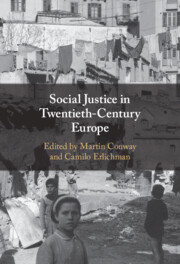Book contents
- Social Justice in Twentieth-Century Europe
- Social Justice in Twentieth-Century Europe
- Copyright page
- Contents
- Contributors
- Acknowledgements
- 1 Social Justice
- 2 Social Justice within a Market Society
- 3 Catholic Conceptions of Social Justice from 1891 to Pope Francis
- 4 Social Justice through Taxation?
- 5 A Fascist Social Justice?
- 6 Social Justice in Authoritarian Central Europe
- 7 Social Justice in a Socialist Society
- 8 Immigrants and Social Justice in Western Europe since the 1960s
- 9 Reimagining Peace through Social Justice in Mid- to Late Twentieth-Century Europe
- 10 Social Justice or Sexual Justice?
- 11 Equity Rules
- 12 Bridging the Void
- 13 Postscript
- Index
2 - Social Justice within a Market Society
The Debate in Western Europe from the End of the Nineteenth Century
Published online by Cambridge University Press: 29 February 2024
- Social Justice in Twentieth-Century Europe
- Social Justice in Twentieth-Century Europe
- Copyright page
- Contents
- Contributors
- Acknowledgements
- 1 Social Justice
- 2 Social Justice within a Market Society
- 3 Catholic Conceptions of Social Justice from 1891 to Pope Francis
- 4 Social Justice through Taxation?
- 5 A Fascist Social Justice?
- 6 Social Justice in Authoritarian Central Europe
- 7 Social Justice in a Socialist Society
- 8 Immigrants and Social Justice in Western Europe since the 1960s
- 9 Reimagining Peace through Social Justice in Mid- to Late Twentieth-Century Europe
- 10 Social Justice or Sexual Justice?
- 11 Equity Rules
- 12 Bridging the Void
- 13 Postscript
- Index
Summary
Shifting conceptions of social justice were intricately entangled with changing conceptions of the market in the late nineteenth and twentieth centuries. Understanding this interwoven history requires an analysis of the anthropological, moral, social, and political implications constructions of a market order. This observation is the starting point for a sketch of three distinctive periods in Western European history of entanglements between conceptions of social justice and understandings of the market. In the first period, defined by the social question, a notion of property as entitlements to social security created the social basis for the recognition of political agency and the empowerment of precarious workers. In a second period, notions of social justice centred on the creation and maintenance of a productive workforce, with sufficient spending power to contribute to the efficiency of markets and the growth of national wealth. The third period was characterised by an understanding of social justice as a disturbance of the price mechanism resulting from the capture of the state by self-interested professionals and interest groups. Social justice is not an alternative to a market morality; they together contribute to shifting entanglements of ‘socially’ informed markets and ‘market’ informed constellations of social justice.
Keywords
- Type
- Chapter
- Information
- Social Justice in Twentieth-Century Europe , pp. 30 - 52Publisher: Cambridge University PressPrint publication year: 2024

